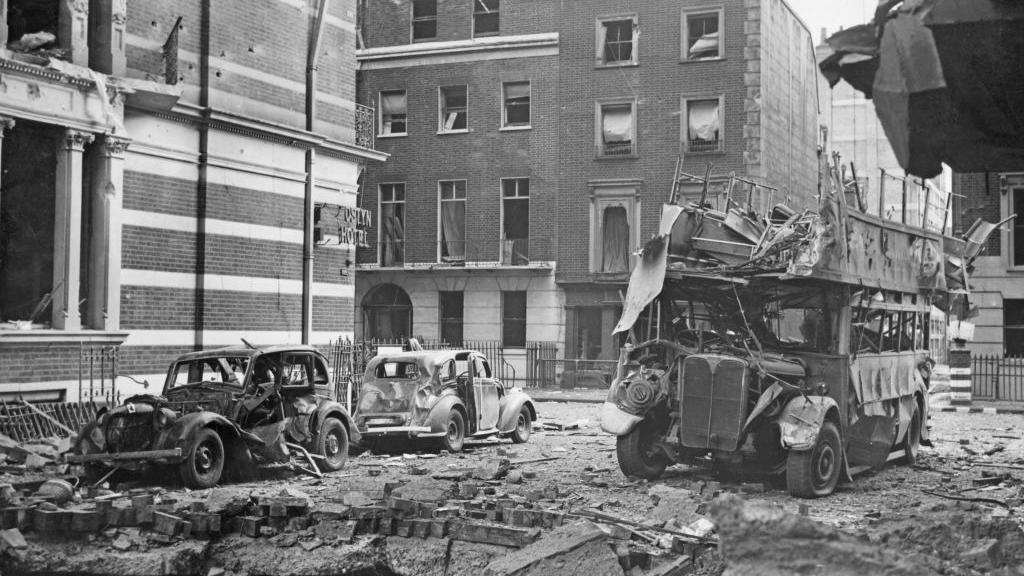Nation falls silent as King leads Remembrance ceremony
Watch: Veterans, Royals and politicians attend Cenotaph Remembrance ceremony
- Published
King Charles has led the nation in two minutes of silence in remembrance of men and women who lost their lives serving in the two world wars or other conflicts.
Tens of thousands of veterans and civilians joined the King in paying their respects to the fallen at the annual National Service of Remembrance ceremony at the Cenotaph in central London.
The King was joined by other members of the Royal Family, including the Prince and Princess of Wales, and political leaders.
Events to mark Remembrance Sunday - observed on the closest Sunday to Armistice Day - are taking place around the country.
The King laid the first wreath on behalf of the nation. Dressed in the Royal Navy uniform of the Admiral of the Fleet, he saluted after stepping back from the Cenotaph.
The King was followed by Queen Camilla’s equerry, Major Ollie Plunket, laying a wreath on her behalf as she is currently recovering from a chest infection.
Prince William, Prince Edward and Princess Anne followed, then Prime Minister Sir Keir Starmer and the country's other political leaders.
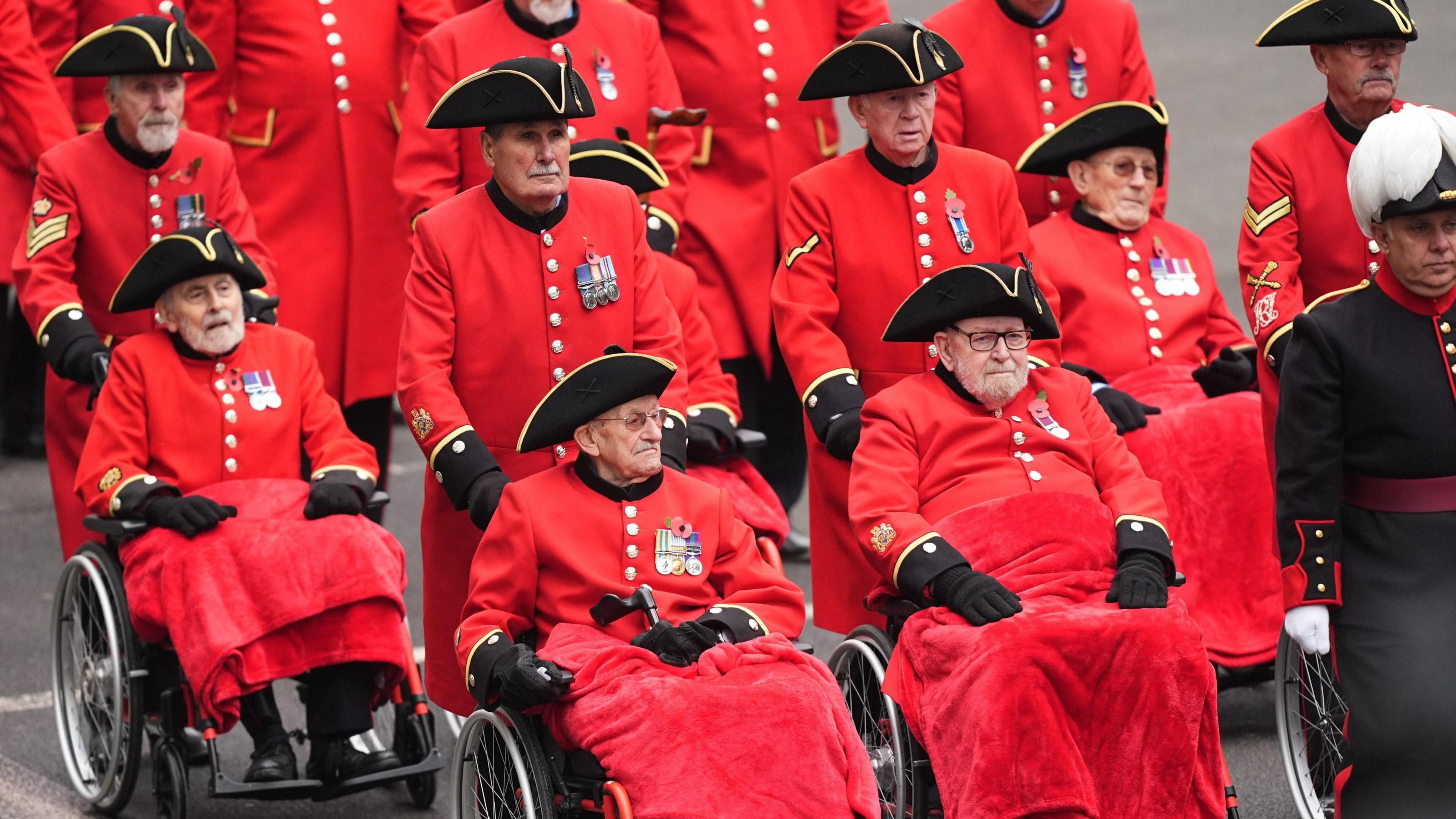
Chelsea Pensioners during the Remembrance Sunday service at the Cenotaph in London
Kemi Badenoch laid a wreath for the first time, a week after being elected the new leader of the Conservatives.
There were also a number of representatives from the new Labour government, including Home Secretary Yvette Cooper and Foreign Secretary David Lammy.
The Princess of Wales watched on from the balcony of the Foreign Office, as is usual, alongside the Duchess of Edinburgh.
The weekend's Remembrance events are among the first official appearances for Catherine following her recent cancer treatment.
Remembrance: Why do we wear poppies?
- Published10 November 2024
Also watching from balconies were Reform UK leader Nigel Farage and Green Party co-leader Carla Denyer. It is tradition for only the heads of parties with six or more seats in Parliament and the leaders of the largest party from each of the devolved nations to lay a wreath.
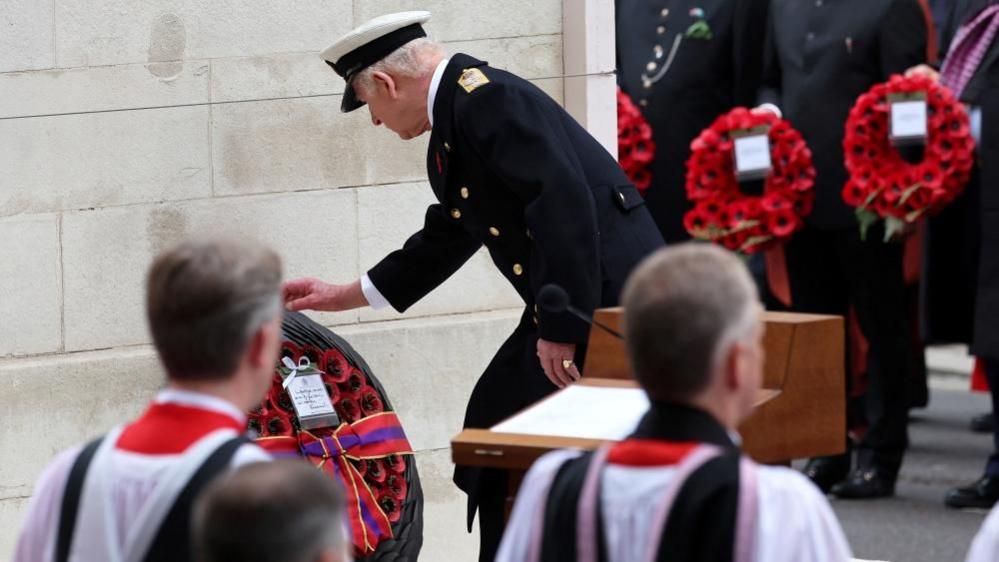
The monarch traditionally leads the first wreath each year
Members of the armed forces, including veterans of World War Two, then laid their wreaths, before commencing a march down Whitehall which took more than an hour to complete.
The thousands-strong group, representing 326 different armed forces and civilian organisations, marched past the Cenotaph. Each group had a wreath that was handed over to join those that had already been placed.
The day's commemoration had officially started at 11:00, when Big Ben chimed to signal the start of the two-minute silence. It was ended by the sound of a cannon blasting from Horse Guards Parade, followed by a bugler playing the Last Post.
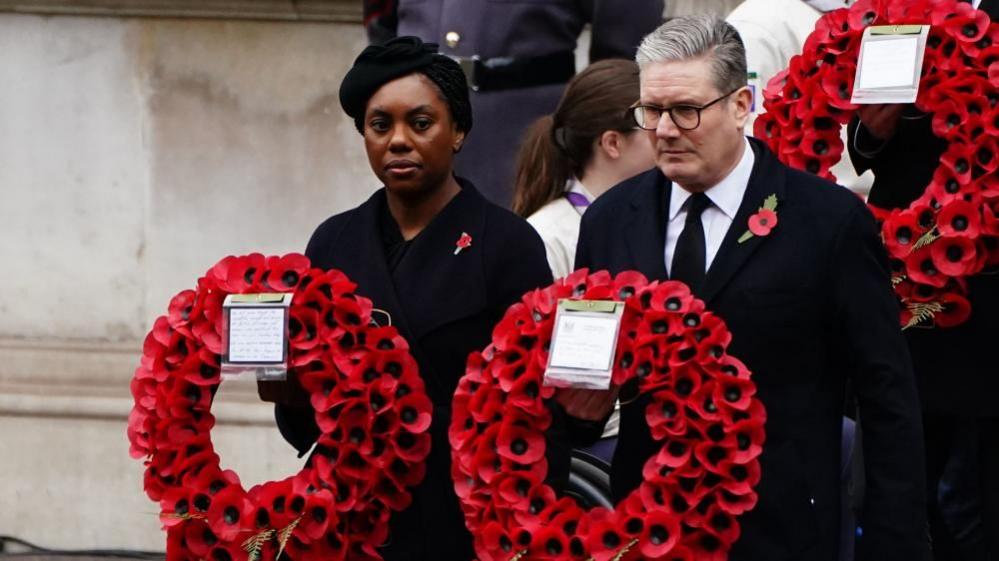
Prime Minister Sir Keir Starmer and Opposition leader Kemi Badenoch laid wreaths
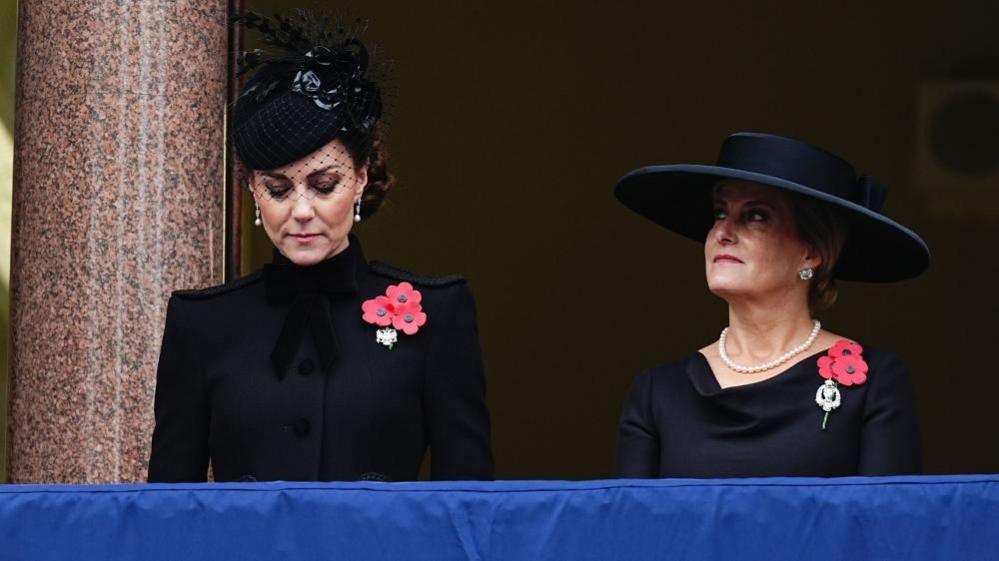
Catherine and Sophie watched from a balcony at the Foreign Office, both of them wearing an arrangement of three poppies
World War Two veterans told the BBC about what the day meant to them.
"For me personally, I come here to remember my shipmates, Army veterans, Royal Air Force and Merchant Navy," said naval veteran Henry Rice.
"I just thank God I survived - I got away with it."
Joe Randall, aged 101, said: "Your mind goes back a bit as well, memories and talking to the old chaps like ourselves. It's been a wonderful day."
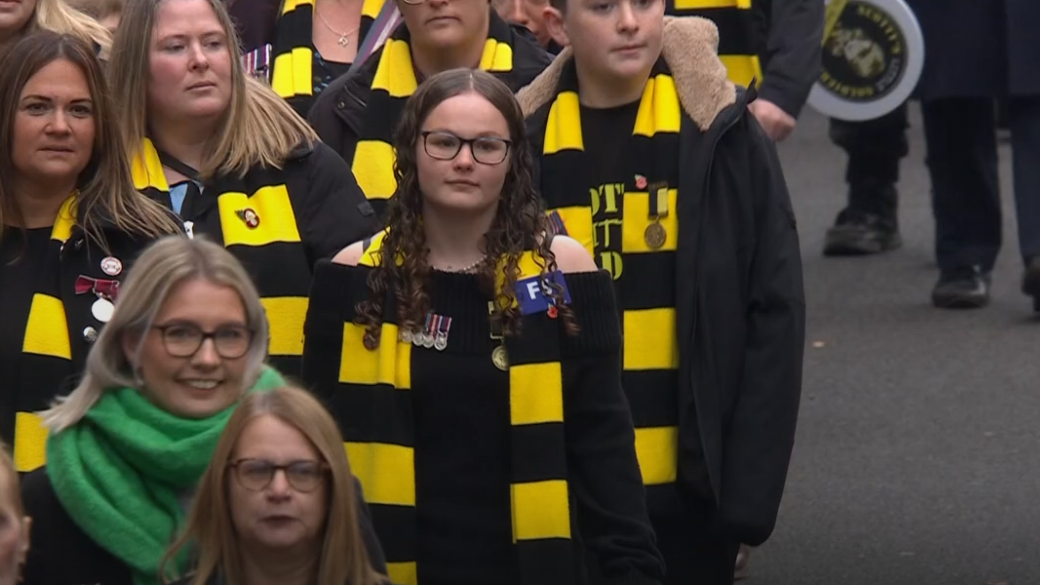
Bereaved children of armed forces personnel also took part in the march past
But most of the ex-servicemen and ex-service women at the ceremony were veterans of more recent conflicts.
Iraq war veteran Karl Hinnett, who suffered severe burn injuries when his vehicle was set alight, said: "Marching at the Cenotaph, it’s a really important moment to appreciate where we've come from and what we've gone through."
"We're often referred to as the unexpected survivors and I'm just really grateful to be alive and be here."
Falklands bomb specialist veteran John Phillips, who lost an arm in a blast, said he thinks about a colleague who did not survive the explosion.
“Many of the veterans will tell you it's very important that these people are remembered forever and their stories will be told forever."
The march past featured veterans in their military association groups alongside charities and civilian organisations.
And among them were 50 young people wearing the yellow and black scarves of Scotty’s Little Soldiers, a charity supporting the children of fallen service people.
Cerie Pallett, who lost her father RAF Sgt Oliver Pallett at the age of nine, carried the wreath for the charity after her and sister were helped by them.
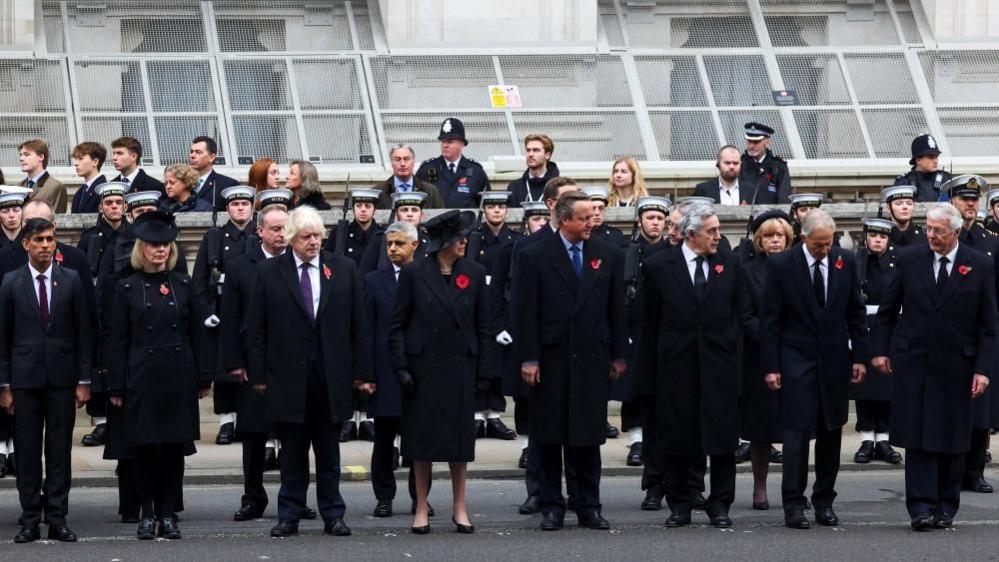
Former prime ministers are traditionally invited to the ceremony and this is the first time there have been eight in attendance, lined up in order of their service
Services are being held in almost every town and city across the UK - with some of the biggest gatherings in Belfast, Edinburgh, Cardiff, Plymouth, Liverpool and Manchester.
In Belfast, Northern Ireland's First Minister Michelle O'Neill took part in the official ceremony, making her the first senior Sinn Féin figure to do so.
Several Sinn Féin politicians have laid wreaths at the Cenotaph in Belfast in previous years, but they have not previously attended the main Sunday ceremony.
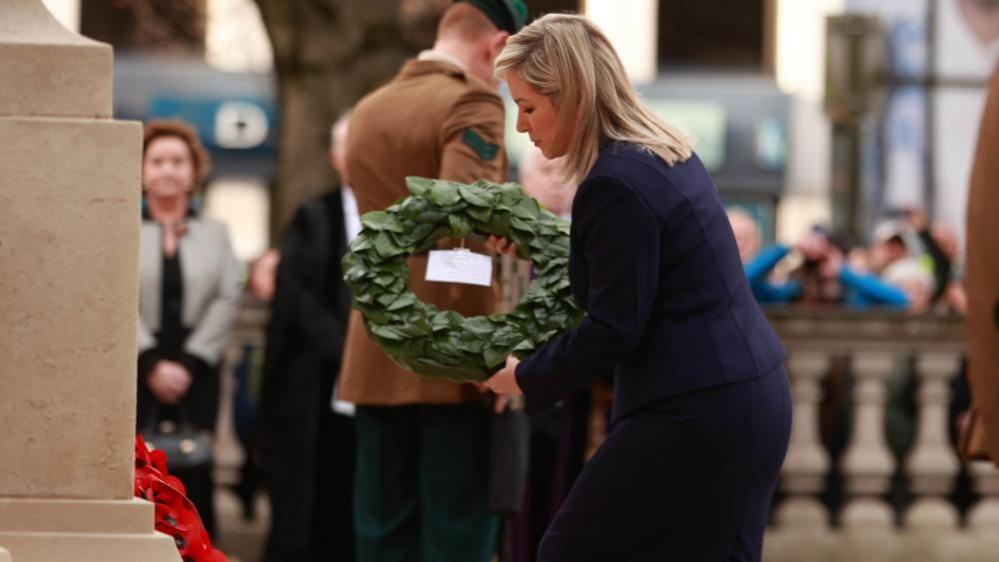
Sinn Féin's Michelle O'Neill laid a laurel wreath at the Cenotaph at Belfast City Hall
In Cardiff, military personnel marched past the City Hall towards to the ceremony at the Welsh National War Memorial in Cathays Park.
First Minister Eluned Morgan honoured the service of remembrance “as important as ever” in an address before the service.
Gatherings took place in Glasgow at the war memorial in George Square, and Scottish First Minister John Swinney was joined by veterans in laying a wreath at the Stone of Remembrance in Edinburgh outside the City Chambers.
He said it was a chance for generations of Scots to honour those who "paid the ultimate price" in conflicts across the globe.
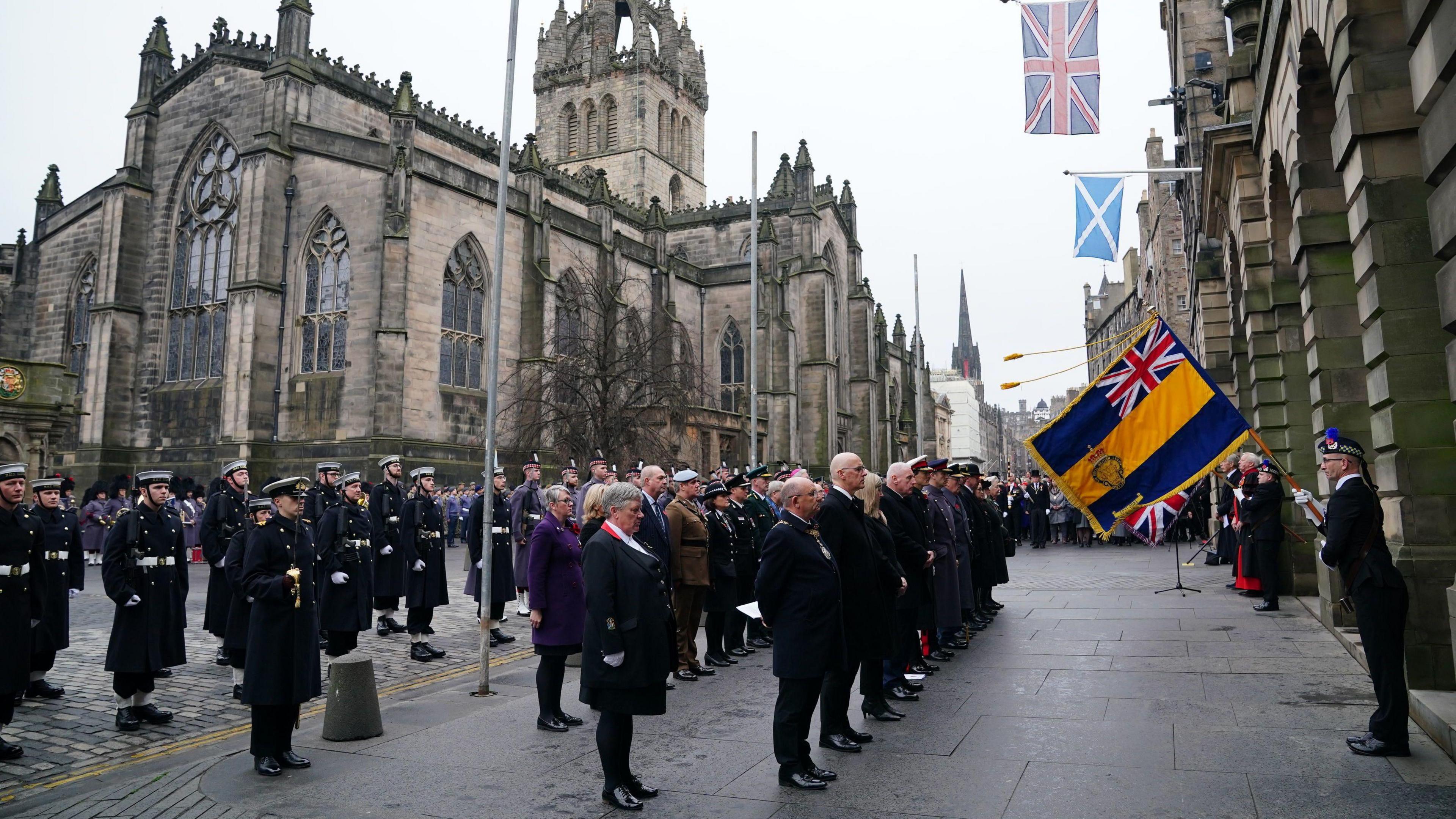
People gathered at the Stone of Remembrance outside the City Chambers in Edinburgh on Sunday
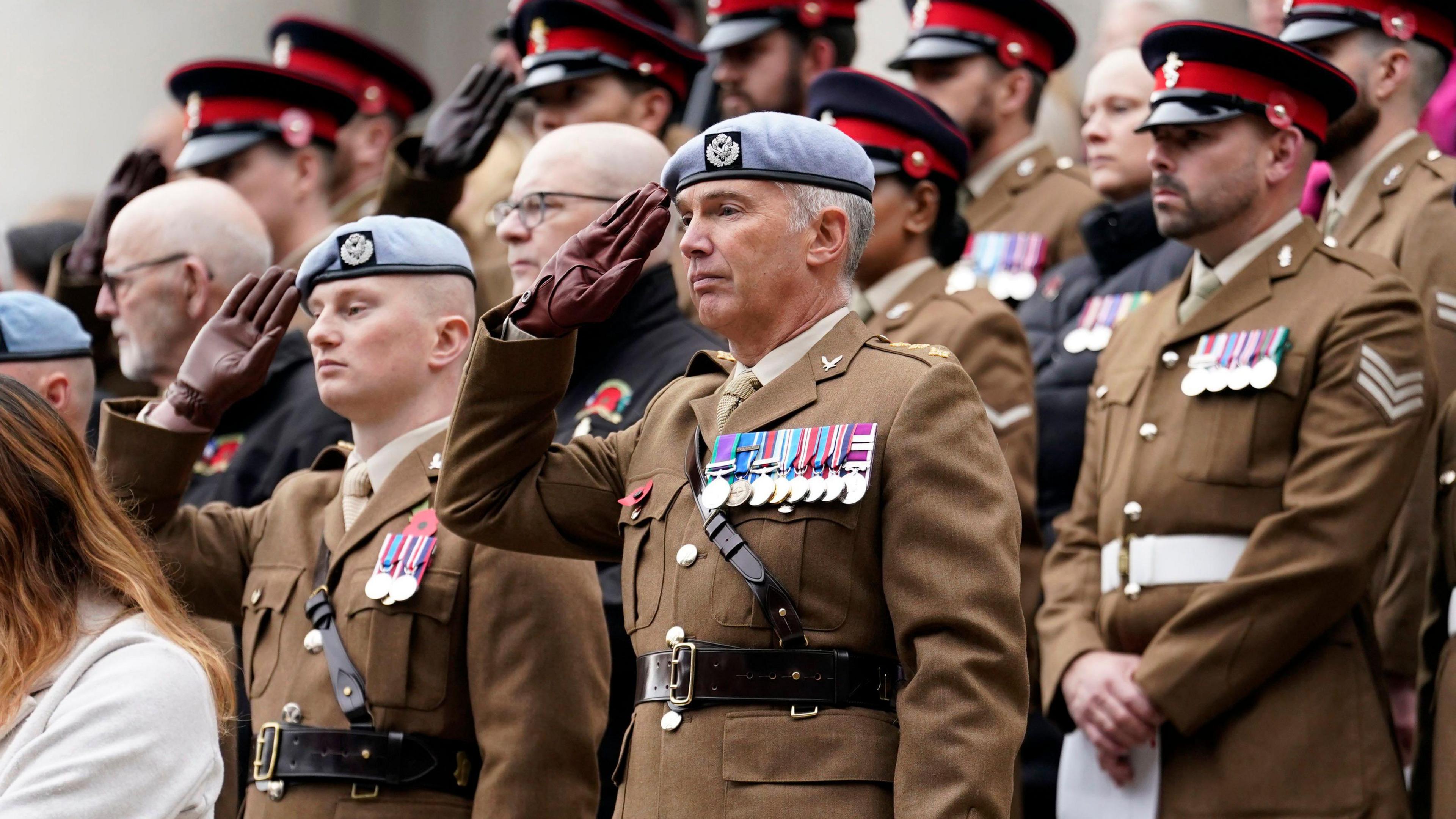
Members of the armed forces gave a salute as the Last Post was played in Guildhall Square, Portsmouth
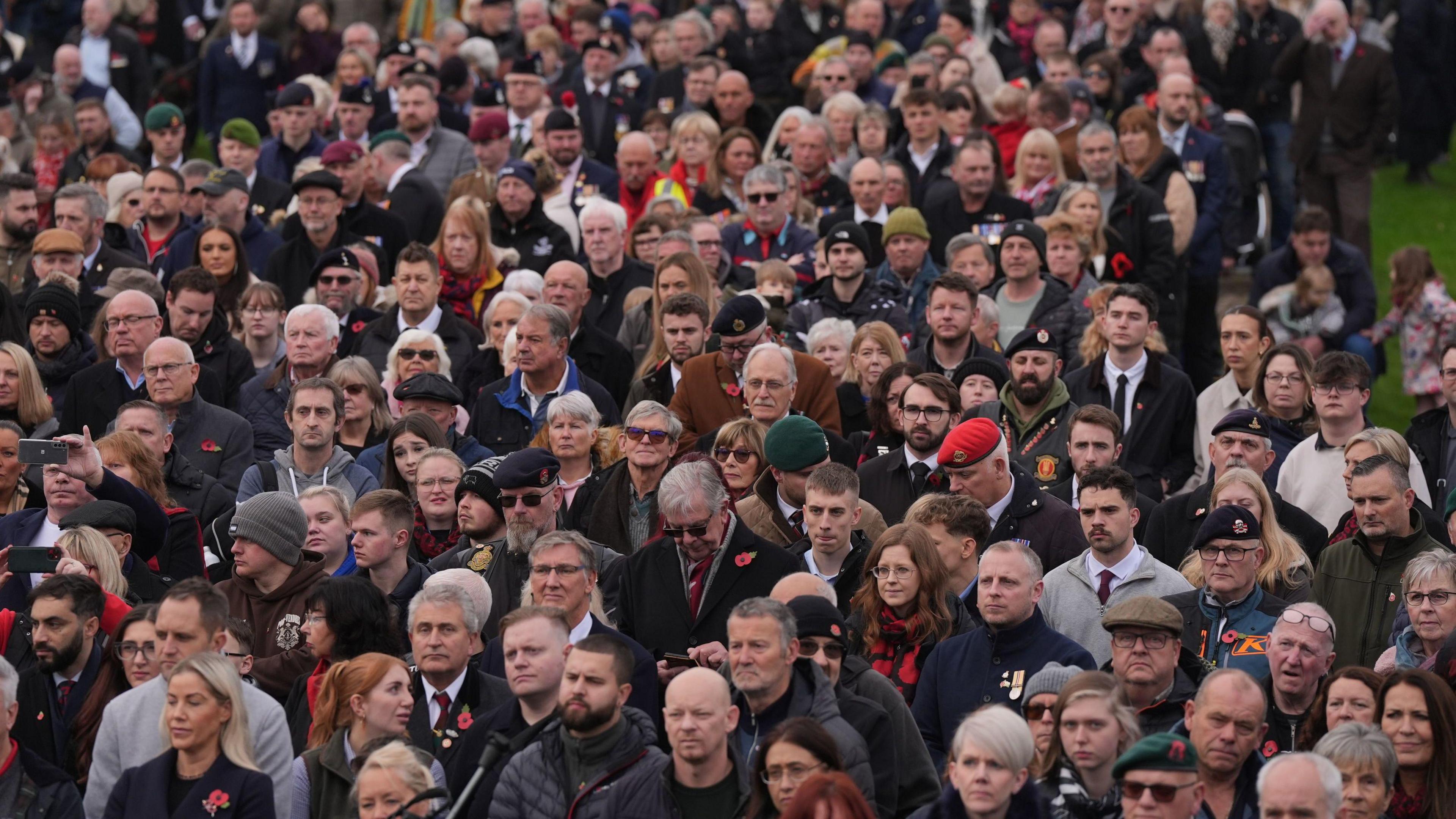
Crowds formed at the National Memorial Arboretum in Alrewas, Staffordshire for Remembrance Sunday
Remembrance Sunday around the UK
The King, Prince William, Catherine and other senior royals also attended the Festival of Remembrance event at the Royal Albert Hall on Saturday night.
Catherine is gradually returning to public duties following her cancer treatment earlier this year.
The King, who has also been treated for cancer, received a standing ovation from the audience when he arrived.
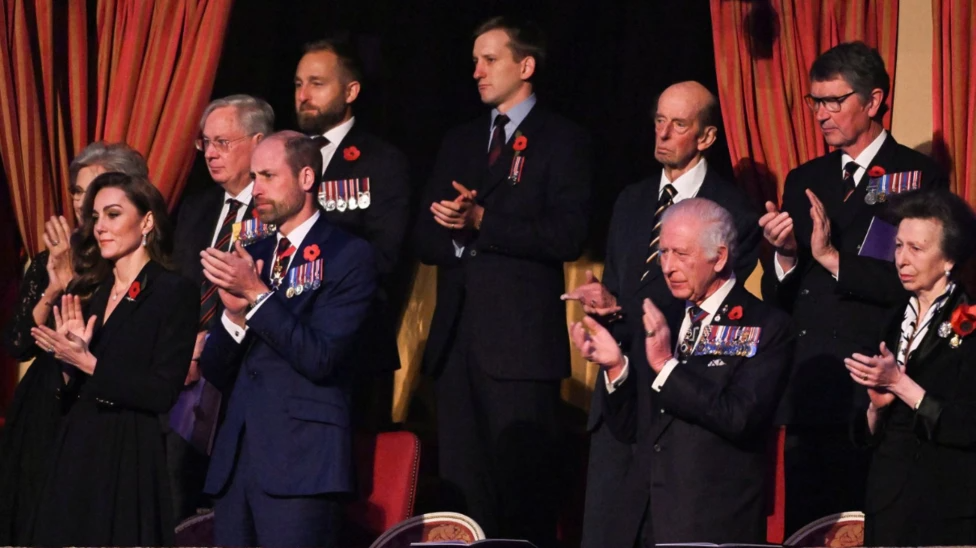
Queen Camilla was absent from Saturday night's The Festival of Remembrance event
The concert and the service at the Cenotaph on Sunday are among the most important events on the royal calendar.
Queen Camilla has withdrawn from both events as she is recovering from a chest infection.
She watched the Remembrance proceedings on television at Raymill, her Wiltshire home, where she also observed the two minutes' silence privately.
It is hoped she will be well enough to return to royal duties within the coming days.
Sunday's events come the day before Armistice Day, which marks the moment World War One ended, at 11:00 on the 11th day of the 11th month, in 1918.
Remembrance events are due to take place on Monday across UK and allied nations.
As on Remembrance Sunday, Armistice Day will also see two minutes of silence as the clock strikes 11:00 in each country.
- Published10 November 2024
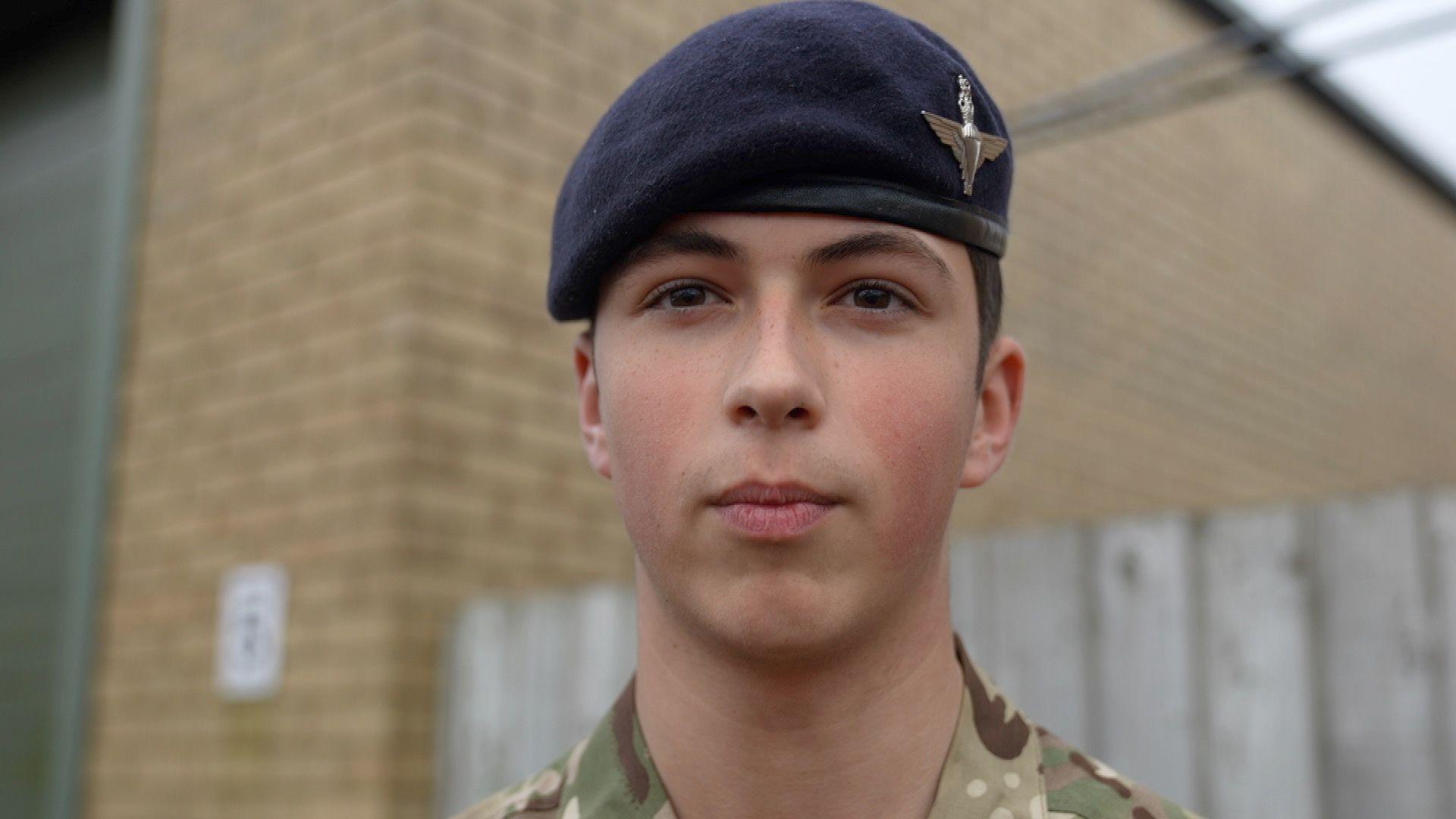
- Published10 November 2024
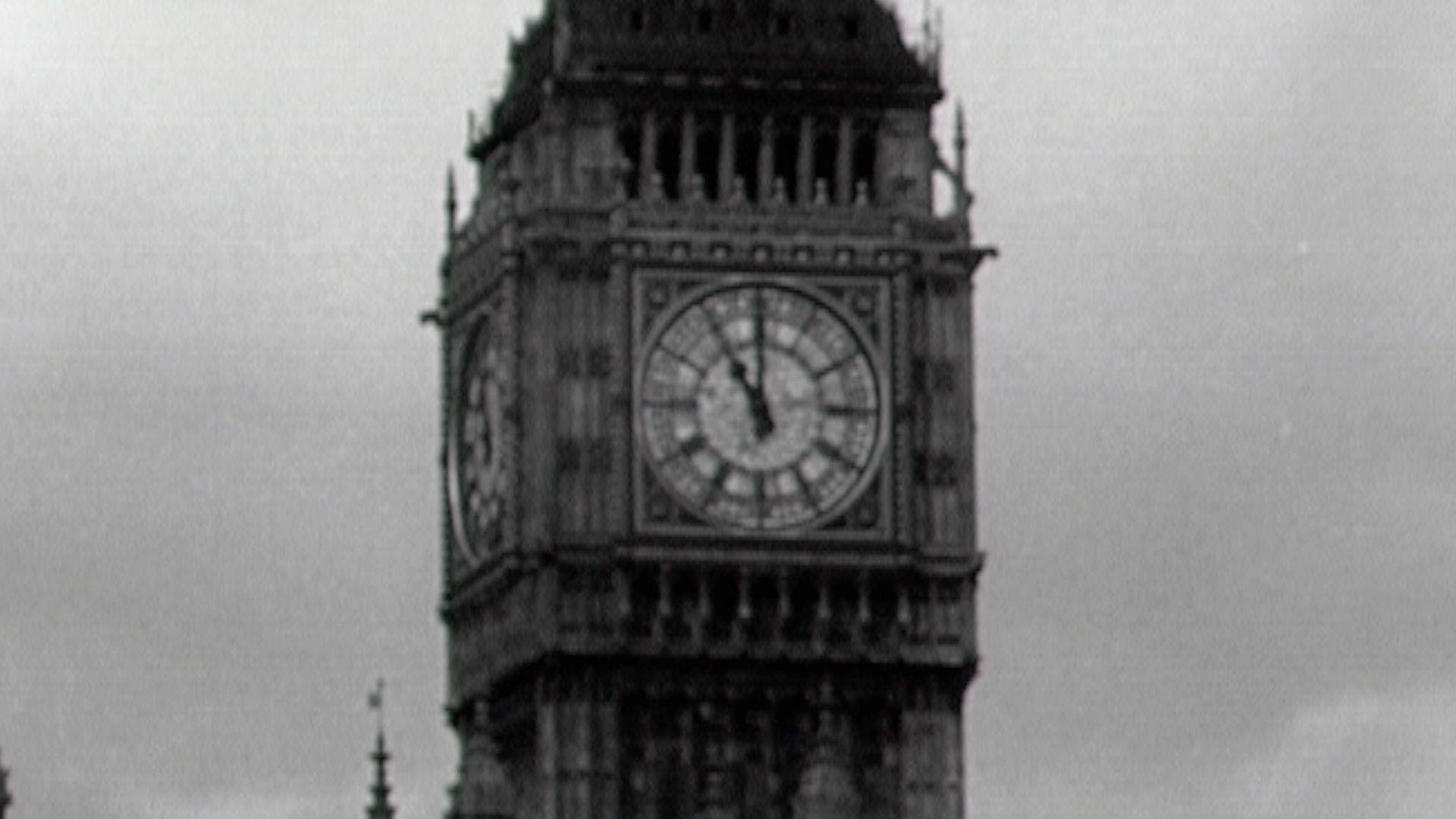
- Published10 November 2024
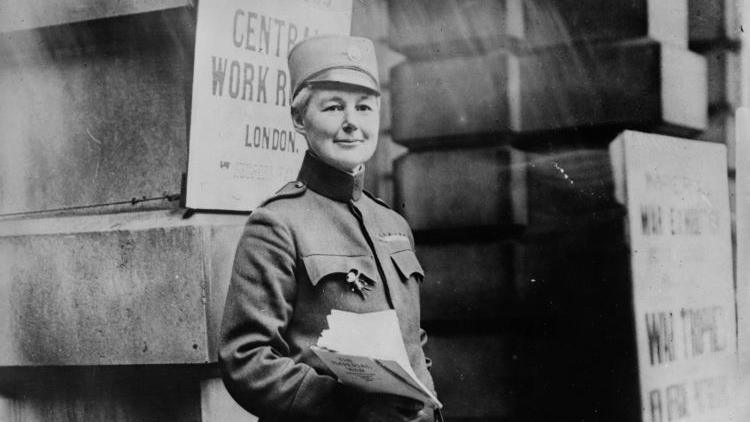
- Published10 November 2024
